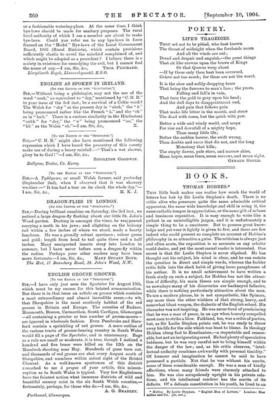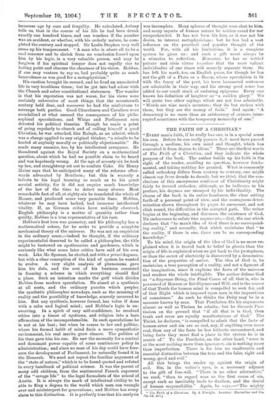BOOKS.
THOMAS HOBBES.* Tars little book makes one realise how much the world of letters has lost by Sir Leslie Stephen's death. There is no critic alive who possesses quite the same admirable critical apparatus, the same wide knowledge and skill in using it, the same catholic temper in appreciation, or the same gift of urbane and luminous exposition. It is easy enough to write like a pedant in an unintelligible jargon, and it is unfortunately a simple thing to be a smatterer. But to possess great know- ledge and yet wear it lightly is given to few, and there are few indeed who could present so complete an account of Hobbes's philosophy in so attractive a guise. The criticism is always just and often acute, the exposition is as accurate as any scholar could desire, and yet the most casual reader is interested. One secret is that Sir Leslie Stephen is never slipshod. He has thought out his subject, his mind is clear, and he can restate the question in direct and simple words, whereas the feebler critic falls into the slack habit of giving loose paraphrases of his author. It is no small achievement to have written a fresh study on such a subject, for Hobbes has not the attrac- tion of difficulty, his main theses are simple enough, and to us nowadays many of his discoveries are hackneyed fallacies, while there is nothing particularly attractive about the man. To use a modern phrase, he is not sympathetic, like Spinoza, any more than the other wielders of that strong, heavy, and somewhat blunt weapon, the dialectic of the English school. His character was not inspiring. He was never tired of proclaiming that he was a man of peace, in an age when honesty compelled most men to strike a blow. Falkland, too, was a critic of parties, but, as Sir Leslie Stephen points out, he was ready to throw away his life for the side which was least to blame. In theology Hobbes clung fast to Erastianism,—a respectable and reason- able, but not an invigorating creed. He had plenty of speculative boldness, but he was very careful not to bring himself within the danger of the law ; and, as his critic observes, " intel- lectual audacity combines awkwardly with personal timidity." Of humour and imagination he cannot be said to have possessed a particle. Not that he was without his merits, some of them considerable enough. He was a man of kindly affections, whose many friends were sincerely attached to him. He was also scrupulously upright in his private rela- tions, and his intellectual candour has the merits of its defects. Of a delicate constitution in his youth, he lived to an
• Hobbes. By Leslie Stephen. "English Men of Letters." London: Mao mill= and Co. [2s. net.]
immense age by care and frugality. He calculated, Aubrey tells us, that in the course of his life he had been drunk exactly one hundred times, and one wonders if the number was an accident, or whether, with his orderly nature, he com- pleted the century and stopped. Sir Leslie Stephen very well sums up his temperament. "A man who is above all to be a cool reasoner and to shrink from no conclusion forced upon him by his logic, is a very valuable person, and may be forgiven if his spiritual temper does not rapidly rise to boiling point and obscure the clearness of his vision. Hobbes, if one may venture to say so, had probably quite as much benevolence as was good for a metaphysician."
His caution brought its reward, and he lived an unmolested life in very troublous times; but he got into bad odour with the Church and sober constitutional statesmen. The wonder is that his reputation was not worse, for his views were certainly subversive of most things that the seventeenth century held dear, and moreover be had the misfortune to estrange both parties. Good Churchmen and Cavaliers were scandalised at what seemed the consequence of his philo- sophical speculations, and Whigs and Parliament men detested his political theories. Though be made a point of going regularly to church and of calling himself a good Christian, he was attacked, like Ralegh, as an atheist, which was a charge applied to any original thinker, "a missile to be hurled at anybody morally or politically objectionable." He made many enemies, too, by his intellectual arrogance. He thundered against the Royal Society on a mathematical question, about which he had no possible claim to be heard and was hopelessly wrong. At the age of seventy-six he took up law, and straightway set out to confute Coke. Sir Henry Maine says that be anticipated many of the reforms after- wards advocated by Bentham ; but this is scarcely a tribute to his legal learning so much as to his great mental activity, for it did not require much knowledge of the law of the time to detect many abuses. Most remarkable fact of all, at eighty-six he translated the whole of Homer, and produced some very passable lines. Hobbes, whatever he may have lacked, had immense intellectual vitality. If, as German critics have unkindly observed, English philosophy is a matter of quantity rather than quality, Hobbes is a true representative of his race.
Hobbes's first love was geometry, and his philosophy has a mathematical colour, for he seeks to provide a complete mechanical theory of the universe. He was not an empiricist in the ordinary sense,—indeed he thought, if the ordinary experimentalist deserved to be called a philosopher, the title might be bestowed on apothecaries and gardeners, which is curiously like what some later critics have said of his own work. Like Mr. Spencer, he started, not with a priori dogmas, but with a clear conception of the kind of system he wanted to evolve. A very slight analysis of phenomena gave him his data, and the rest of his business consisted in framing a scheme in which everything should find a place. Such an intention marks the gulf which divides Hobbes from modern speculation. He aimed at a synthesis at all costs, and the ordinary puzzles which perplex the synthetic philosopher nowadays, such as the meaning of reality and the possibility of knowledge, scarcely occurred to him. But any synthesis, however formal, has value if done with a calm and logical mind ; and Hobbes's logic is un- swerving. In a spirit of easy self-confidence, he resolved ethics into a tissue of egotisms, and religion into a bare affirmation of the incomprehensible. In such speculations he is not at his best ; but when he comes to law and politics, where his formal habit of mind finds a more sympathetic environment, his real merits grow clearer. The politics of his time gave him his cue. He saw the necessity for a central and dominant power capable of some continuous policy in administration; and since no man of his day could have fore- seen the development of Parliament, he naturally found it in the Monarch. We need not repeat the familiar argument of the "state of nature," which is to be found quoted and refuted in every handbook of political science. It was the parent of many odd children, from the sentimental French exponent of the "savage life" to the legal formalists of the school of Austin. It is always the mark of intellectual virility to be able to fling a dogma to the world which men can wrangle over and misinterpret for generations ; and Hobbes has every claim to this distinction. It is perfectly true that his analysis was incomplete. Many spheres of thought were shut to him, and many aspects of human nature he neither cared for nor comprehended. It has not been his fate, as it was not his desire, to interest metaphysicians; but he has had a vast influence on the practical and popular thought of the world. For, with all his limitations, it is a complete system he gives us ; and such a gift must always be a stimulus to reflection. Moreover, he has so welded private and civic virtue together that the most valiant individualist of our times will scarcely separate them. He has left his mark, too, on English prose, for though he has not the gift of a Plato or a Bacon, whose speculation is lit with the fancy of the poet, his terse hammered sentences are admirable in their way, and his strong good sense has added to our small stock of enduring epigrams. Every one knows his definition of laughter as "a sudden glory." We will quote two other sayings which are not less admirable. "Words are wise men's counters ; they do but reckon with them, but they are the money of fools." And again : "A democracy is no more than an aristocracy of orators, inter- rupted sometimes with the temporary monarchy of one."



































 Previous page
Previous page